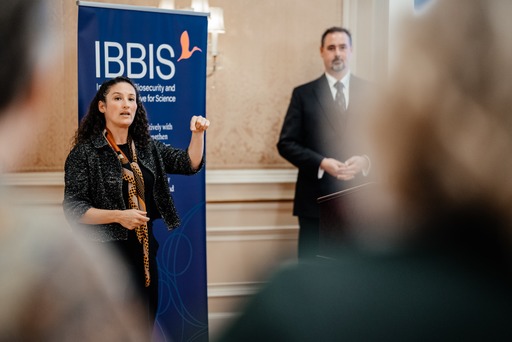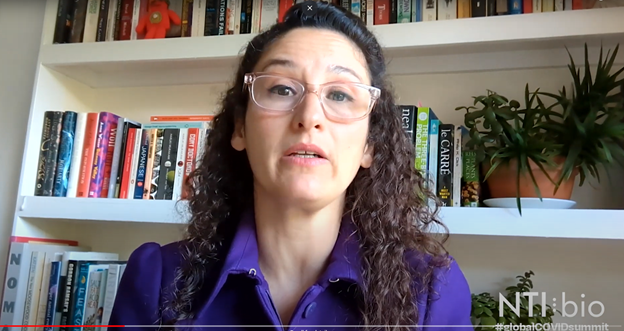
NTI | bio experts address G7 Global Partnership Working Group in Berlin
NTI experts briefed government representatives at a G7 working group meeting in Berlin.
Thanks
to two new, generous grants, the Nuclear Threat Initiative (NTI) will significantly
expand its biosecurity work under the leadership of Elizabeth Cameron, Ph.D., newly named vice
president, global biological policy and programs with guidance from newly
elected Board Member Margaret A. Hamburg, MD. The Open Philanthropy Project awarded NTI with $6
million over three years in operational and programmatic support. Generous
support of $250,000 from the Bill & Melinda Gates Foundation will accelerate NTI’s
plans to develop a Global Health Security (GHS) Index in partnership with the Center
for Health Security at the Johns Hopkins Bloomberg School of Public Health and
the Economist Intelligence Unit.
The
Open Philanthropy Project grant will allow NTI to develop new initiatives to
curb global catastrophic biological risks, catalyze international biosecurity
norms and innovation, enhance biosurveillance for emerging threats, and
advocate for measurable biosecurity commitments as an integral component of the
Global Health Security Agenda.
“We
are deeply appreciative of this significant support—and vote of confidence—from
the Open Philanthropy Project. In our interconnected world, biological threats
are among the most dangerous and difficult. NTI is committed to generating new
international approaches to strengthen biosecurity,” said NTI CEO and
Co-Chair Ernest J. Moniz. “We are extremely grateful that Peggy Hamburg will
be joining the NTI Board, bringing stellar qualifications in policy development
in the biological arena.”
“Funding
from the Bill & Melinda Gates Foundation is a welcome imprimatur of our
approach on the Global Heath Security Index. We are fortunate to have Beth’s
expertise and leadership to guide our work on global biological policy and
programs,” added NTI President Joan Rohlfing.
The GHS Index will assess countries’
capability to prevent and mitigate high-consequence biological events, taking
into consideration political and socioeconomic risk factors, as well as a
country’s broader healthcare system. NTI, with support from the Open
Philanthropy Project and the Robertson Foundation, recently partnered with the
Center for Health Security at the Johns Hopkins Bloomberg School of Public
Health and the Economist Intelligence Unit to develop a comprehensive GHS Index
framework based on publicly available data and informed by an international
panel of experts.
As
Foreign Secretary of the National Academy of Medicine, Dr. Margaret Hamburg serves as senior advisor on international
matters and is the liaison with other Academies of Medicine around the world.
She is President-elect of the American Association for the Advancement of
Science. She is an internationally recognized leader in public health and
medicine, having served as Commissioner of the U.S. Food and Drug
Administration (FDA) for almost six years. Before joining FDA, Hamburg was
founding vice president and senior scientist at NTI.
The
Open Philanthropy Project identifies
outstanding giving opportunities, awards grants, tracks the results, and
publishes the findings. Its mission is to give effectively and share findings
openly so that others may build on them. One of the Project’s focus areas is
global catastrophic risks including biosecurity and pandemic
preparedness.
The
Nuclear Threat Initiative works to
protect our lives, environment, and quality of life now and for future
generations. We work to prevent catastrophic attacks with weapons of mass
destruction and disruption (WMDD)—nuclear, biological, radiological, chemical,
and cyber. Founded in 2001 by former U.S. Senator Sam Nunn and philanthropist
Ted Turner who continue to serve as co-chairs, NTI is guided by a
prestigious, international board of directors. Ernest J. Moniz serves as chief
executive officer and co-chair; Des Browne is vice chairman; and Joan
Rohlfing serves as president.
Since
its founding, NTI has been committed to addressing biosecurity threats. Work
has included creating regional disease surveillance networks as well as a
“network of networks” that connects regional disease surveillance organizations
in the Middle East, Southern Africa and Southeast Asia; creating an Emergency
Outbreak Response Fund at the World Health Organization; and sponsoring the
National Academy of Science’s 2004 report, Biotechnology
Research in an Age of Terrorism, which led the U.S. government to change
how it provides oversight for federal R&D funding for dual use research of
concern and to create a federal advisory board for biosecurity.
More
about NTI’s biosecurity program can be found at www.nti.org/about/biosecurity.
###
Sign up for our newsletter to get the latest on nuclear and biological threats.
NTI experts briefed government representatives at a G7 working group meeting in Berlin.
NTI joined governments and organizations from around the world for the 2nd Global COVID-19 Summit on May 12, 2022 and committed to provide $35,000 to the pandemic preparedness and global health security financial intermediary fund.
NTI and partners hosted virutal side events on using the GHS Index as a guide for responding to COVID-19 and on strengthening biosafety and biosecurity.


